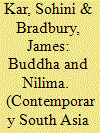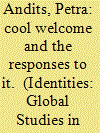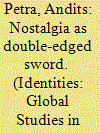|
|
|
Sort Order |
|
|
|
Items / Page
|
|
|
|
|
|
|
| Srl | Item |
| 1 |
ID:
177941


|
|
|
|
|
| Summary/Abstract |
This article explores the lives and careers of two people from left-leaning, political families in Kolkata. Their formative years and political horizons were shaped by the Left Front government in West Bengal (1977–2011), and they now negotiate the aftermath of the communists’ defeat in 2011 in their day-to-day lives. Buddha was born in Bangladesh, and is now a grassroots leader of the Communist Party of India (Marxist) in suburban Kolkata. His story encapsulates the struggle of building a political career in the aftermath of electoral defeat, mixing the pragmatism of being an important organizer or ‘party man’ with his commitment to cultural politics. Nilima is a young woman from a Leftist family employed by a microfinance institution (MFI). Her upbringing around the party and imbued with communist ideological values now conflicts with a thoroughly neoliberal workplace. Their experiences both in terms of their activism as well as their day-to-day experiences of work in Kolkata’s neighbourhoods offers insights into the contemporary political moment in the city after communism.
|
|
|
|
|
|
|
|
|
|
|
|
|
|
|
|
| 2 |
ID:
153227


|
|
|
|
|
| Summary/Abstract |
This article examines the social aspects of Australian-Hungarians’ return to Hungary after the collapse of communism. I suggest that one of the most disillusioning aspects of homecoming for this group of Australian-Hungarians was the cold welcome they received from those who had stayed behind. The main task of this article is to analyse how returnees grappled with the negative attitudes of the stayees. Three major strategies are identified by means of which returnees facilitated their feeling of belonging: contestation, acceptance or dismissal of stayees’ perspectives. Returnees’ efforts to achieve a sense of belonging suggest that the nature of national membership is fundamentally fragile and porous and underlines that self-definitions are far from being either unconditional or ascribed. By placing contrasting narratives side by side, this article draws attention to the intersubjective elements involved in defining belonging.
|
|
|
|
|
|
|
|
|
|
|
|
|
|
|
|
| 3 |
ID:
173688


|
|
|
|
|
| Summary/Abstract |
This paper aims to capture the complex process through which former socialist North Koreans are remade as South Koreans. I argue that the process by which border crossers from North Korea are remade into post-socialist subjects is complex and multi-dimensional. I address the interlocked nature of institutions and subjectivities in citizen-making processes. On the one hand, it involves the institutionalizations of border crossers with the purpose of screening out “dangerous socialist subjects” for security reasons, followed by “post-socialist” education at Hanawon. On the other hand, it also entails the cultural dynamics of the citizen-making processes. Border crossers are taught not only about political democracy and the economic market, but the cultural learning of resilience to cope with hardship and uncertainty in South Korea. This paper finds two distinctive responses to the cultural learning of resilience—fear and rejection. In this sense, the institutionalizations and the cultural teaching of resilience have unintended consequences. These citizen-making processes raise the question of what characterizes normal subjectivity in a modern, marketized economy. Rather than accepting these normal assumptions as given and natural, this paper tries to uncover hidden assumptions and to problematize the arbitrariness of these normative assumptions. What appears normal, rational, free, and democratic can be actually accidental, temporary, absurd, and socially constructed. This paper attempts to challenge and demystify the meaning of rational, free, democratic, resilient, and normative citizenships that tend to be taken for granted.
|
|
|
|
|
|
|
|
|
|
|
|
|
|
|
|
| 4 |
ID:
185331


|
|
|
|
|
| Summary/Abstract |
Based on multi-sited ethnography, this article examines the return visits of Australian-Hungarian diaspora subjects after the fall of the Berlin Wall. In particular, it explores how nostalgia becomes an instrument for navigating the ambiguities, paradoxes, and disappointments of return and forging new and creative relationships with the home country. I argue that as much as nostalgia has contributed to the shattering of returnees’ illusions in the face of ‘reality’ upon returning, it has also helped them to facilitate deeper feelings of immersion with their home country. In this way, this article elucidates the restorative properties of nostalgia for identity and belonging.
|
|
|
|
|
|
|
|
|
|
|
|
|
|
|
|
| 5 |
ID:
161354


|
|
|
|
|
| Summary/Abstract |
This article studies the masculinities of Russian-speaking miners in Kazakhstan through an ethnographic study conducted in a miners’ sanatorium, a place of heightened sociality. Studies of gender in Central Asia have mostly focussed on women, and both masculinity and femininity are studied in relation to Islam and the nation-state. This article aims to make a contribution to the study of working-class masculinities in Northern Kazakhstan, arguing that labour and professional identities are important in performing masculinities. Kazakhstani miners wish to show that they are good colleagues, good drinkers, sexually capable and providers for the family. New economic pressures and deteriorating work conditions challenge the miner’s body and make it hard for miners to live up to the hegemonic masculinity.
|
|
|
|
|
|
|
|
|
|
|
|
|
|
|
|
|
|
|
|
|